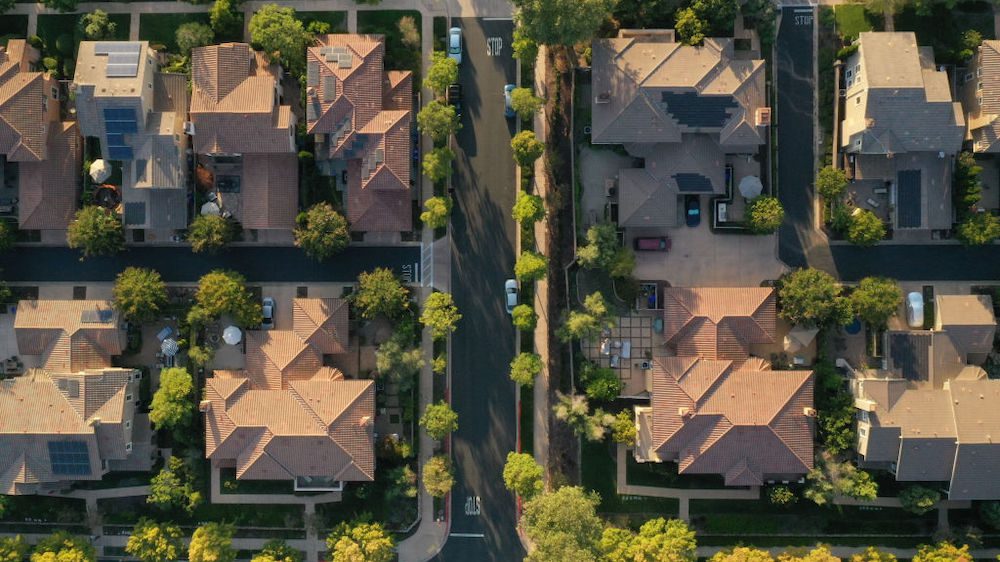
Bing Guan/Bloomberg via Getty Images
The mortgage market recorded its best quarter in years this spring, a reflection of how the housing market is booming in 2020 even as much of the economy stumbles.
Lenders issued $1.1 trillion in home loans between April and June, according to mortgage-data firm Black Knight Inc. That was the biggest quarter in the company’s records, which date to 2000. Lenders extended roughly $2.5 trillion in home loans in all of 2019.
Refinancings, up more than 200% from a year ago, drove the increase. Mortgage rates hit new lows multiple times this year, falling below 3% for the first time in July. The low rates have made millions more Americans eligible to save money on their monthly payments. Purchase mortgages, though, fell 8% from a year earlier.
Dena and Patrick Driscoll closed on their refinance in April, trading in their Federal Housing Administration loan for a conventional one. That got them a rate of about 3%, more than 1 percentage point lower than their previous one, and they no longer had to pay FHA mortgage insurance. That slashed the monthly payment on their Philadelphia home from about $2,000 to roughly $1,500.
The Driscolls, who have kept their jobs during the coronavirus pandemic, are using some of the difference to cover the cost of activities for their two elementary-school children, who just started a fully remote learning program.
The money “gives us a little extra cushion, but it gets eaten up by having to pay for these extra things—making sure they have care at times when I can’t provide it,” Mrs. Driscoll said.
The mortgage market’s response to the pandemic is the latest in a series of seemingly opposing indicators of Americans’ financial health.
Many renters are worried about getting evicted after losing jobs or taking pay cuts. Many out-of-work homeowners are staying afloat for now—but only because lenders are letting them temporarily skip mortgage payments.
Meanwhile, many wealthier Americans with steady jobs, stuck at home with fewer places to spend money, are faring well. The pandemic and record-low rates have nudged many of them to buy second homes in more-rural areas or to shop for houses with more space.
Home sales jumped almost 25% in July, the strongest monthly gain on record. Home prices have continued to rise even during the pandemic, pushing homeownership further out of reach for many Americans.
“This boom in mortgage originations isn’t necessarily going to be that awesome for the broader economy,” said Ralph McLaughlin, chief economist at Haus, a home-finance startup. “There is less of a multiplier effect in the economy when somebody refinances versus buying a house.”
What’s more, the catalyst for low rates, a limp U.S. economy, is the same force that has caused millions of Americans to lose jobs or even go hungry. The Federal Reserve, worried about the economy’s fallout, cut interest rates to near zero earlier this year and said it would buy an essentially unlimited amount of mortgage-backed securities.
Nervous investors are also driving the low mortgage rates. Mortgage rates tend to move in the same direction as the yield on the 10-year Treasury note. Yields fall when anxious investors clamor for safe-haven assets like Treasury bonds.
The mortgage market had been on a tear before the pandemic. Originations last year reached their highest level since 2006, according to industry research group Inside Mortgage Finance.
Then, early this spring, home sales fell sharply as the pandemic pummeled the U.S. Many would-be buyers were too uncertain about their job prospects to commit to buying a home, and stay-at-home orders prevented some real-estate agents from showing homes in person.
Soon after, though, many mortgage lenders were overwhelmed by a deluge of refinance and purchase applications from those with the means to take advantage of low rates. Many lenders have since increased capacity, expecting the lending boom to last until at least the end of the year. Mortgage lender Draper and Kramer Mortgage Corp. has grown its staff, said Matt Patterson, executive vice president of business development.
The housing market has remained one of the most resilient sectors of the economy through the pandemic, positioning itself to play an important role in an eventual recovery. But that isn’t likely to happen soon, economists said.
Lance and Jennifer Haun closed on their Vancouver, Wash., home in May, locking in a rate of 3.125%. They had rented in the area for about a year after moving from the San Francisco area. Low rates helped persuade them to put down an offer.
“It was the perfect time to pull the trigger,” said Mr. Haun, a marketing consultant.
The post Mortgage Refinancings Boom, Even as Coronavirus Hits Economy appeared first on Real Estate News & Insights | realtor.com®.
source https://www.realtor.com/news/real-estate-news/mortgage-refinancings-boom-even-as-coronavirus-hits-economy/
No comments:
Post a Comment